It had been a while since I got a new horse. But when I recently began the process of buying a new one, I was reminded about how fragile the bond of trust is between a horse and rider is. I had to start from scratch and win over the trust of my new horse (before I could win riding competitions).
There are signs you can look for that indicate that a horse trusts you, but at the end of the day, it’s really about a simple conversation between you and your horse. How well do you listen to your horse? Do you know how to ask for things in a way that your horse understands?
As you have that conversation with your horse over time, here are some signs to look for that indicate you’re making good progress in building a strong bond.
What Are the Signs That a Horse Trusts You?
When a horse trusts you, there will be telltale signs to show they are comfortable around you and are eager to please you and obey your requests. A trusting horse will:
- Come when called
- Approach you
- Stand quietly to be handled and saddled
- Show relaxed body language
- Lower their head when bridled
- Move politely out of your way when asked with a light pressure or vocal command
- Show signs of being affectionate toward you
- Respect you and obey your leadership
- Stop when asked, even when they want to run
Bonding With Your Horse
When you talk with your horse or ask for them to do something, you’re initiating a conversation. Essentially, your conversation needs to follow the same rules as human conversations. You wouldn’t speak to someone who is clearly not listening to you, nor would you expect that person to do as you ask when they couldn’t hear you or didn’t understand what you wanted.
Good conversations are also built on trust and bonding. Bonding with your horse is how you develop open communication that helps them understand what you want and, in return, helps them do what you ask. Through bonding, your horse learns they can count on you, that you can and will keep them safe, and that you are a responsible leader and herd member. Remember, horses are herd animals and they identify with the concept of family. You will become their family, and soon, they will trust you in their personal space.
Before you launch into bonding activities with your horse, you need to learn about your horse’s body language. Their body language tells you how they are feeling, if they are listening to you, and if they are ready to show you affection.
Next is basic riding time. Take your horse out hacking before you start asking for advanced training like the piaffe and leg yielding. Hacking is also a great way to spend quality time with your horse.
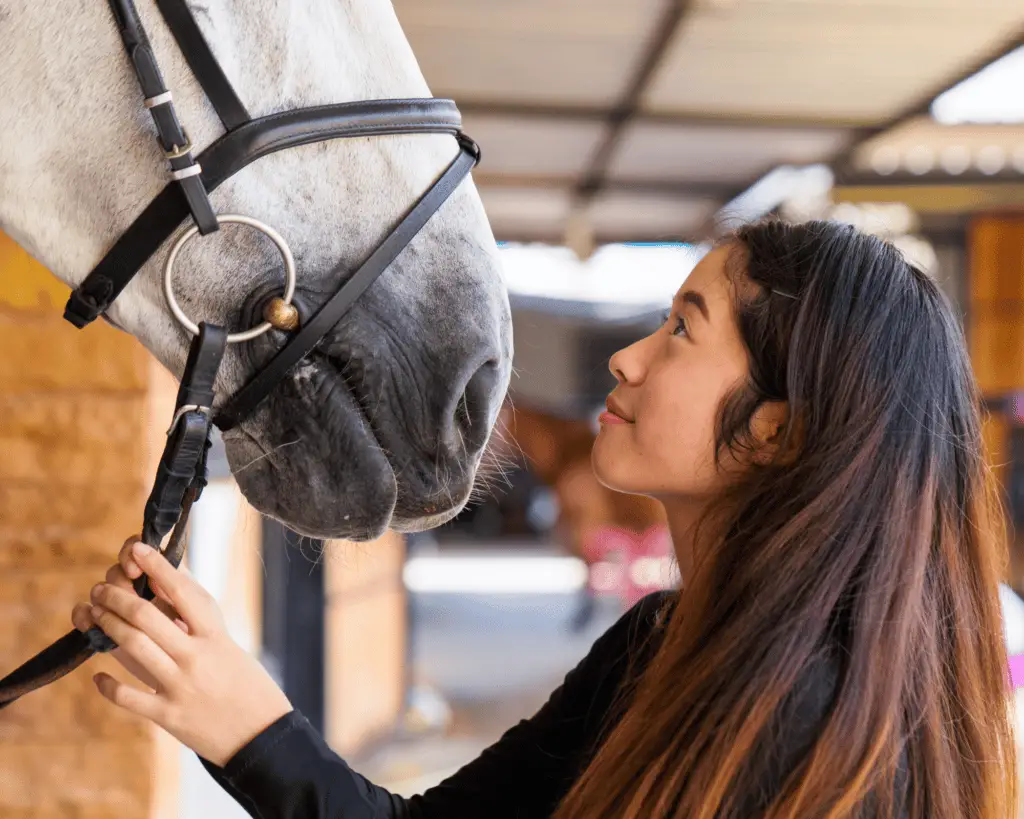
The Horse’s Body Language
Horses have a comprehensive body language system. The more time you spend around them and watch them, the better you will read what their bodies are telling you about what that horse likes or doesn’t like. Here are a few basic body language elements to look out for as you begin training:
1. Flat Ears vs. Raised & Pointed Ears
When a horse has their ears pinned down or flattened against their head, they are showing you they aren’t happy, and you have walked into one of many dangerous situations with horses. Combine the flattened ears with body tension, and you’ve got a horse that’s not ready to listen to you.
Horses that haven’t had good human interaction may pin their ears when they are touched on the head and neck area or if you suddenly move in behind them. Spending time with a nervous or frightened horse can help that horse form a strong bond with their rider. Earning that horse’s trust will require patience and dedication.
A horse with one ear pointed forward and one ear pointed toward you is when the horse shows they are listening to you. Watching the horse’s body language, you can tell if a horse is relaxed and ready to show affection.
2. Hard Eye Contact vs. Scanning Eyes
A horse that trusts their owner will look them in the eye while standing calmly. The horse’s relaxed facial expression tells you the horse is ready to turn to you as a good leader.
In contrast, a horse that is frightened may break eye contact, with their eyes flitting around to assess any nearby threats and look for potential opportunities to get out of the situation they’re in.
3. Hanging Lower Lip vs. Pinched Lower Lip
When a horse is in a loving bond with their rider, they are comfortable and relaxed enough to face any new challenges without becoming wild and hurting you as their friend. A horse nibbles at the person they trust when they feel relaxed. Their lower lip may hang as a sign of relaxation and a horse may exhale in deep sighs as one of many telltale signs that they are at peace.
Horses are prey animals, so when they are feeling nervous or threatened, they may tuck in their lower lip. Nervous horses challenge you as a rider, since a nervous horse obeys poorly and such a horse makes for a poor riding partner.
4. Tail Flicking or Tail Tucked In vs. Relaxed
Other signs that your horse doesn’t trust you or the situation they are in include when they flick their tail from side to side in a show of irritation. In such a situation, it is imperative you stay calm and show the horse a sign that they can trust you. Spending time with them and engaging in desensitization training helps build their confidence in you and in unusual situations.
A tucked tail can indicate a medical issue, such as with a horse that has colic. It can also show the horse is submissive or scared. Build their respect and trust by showing affection and helping the horse become part of your herd. Groom this horse daily so they get used to being touched and patiently wait for the rest to fall in place. Show this horse you are their friend and their person.
A horse that trusts you and is comfortable in their situation will be more likely to have a relaxed tail that is neither flicking around nor tucked in.
5. Head Held High vs. Head Held at Normal Eye Level
“Stargazers” are horses that don’t trust or respect people because they negatively associate people with pain or abuse. Good leadership skills like being predictable and dependable to the horse will go a long way to rebuilding their trust. By raising their head high, the horse is trying to place you lower in the pecking order than them and it is a sign they aren’t ready to accept you as their leader.
When a horse lowers their head to a normal level, that’s another sign that a horse trusts you.
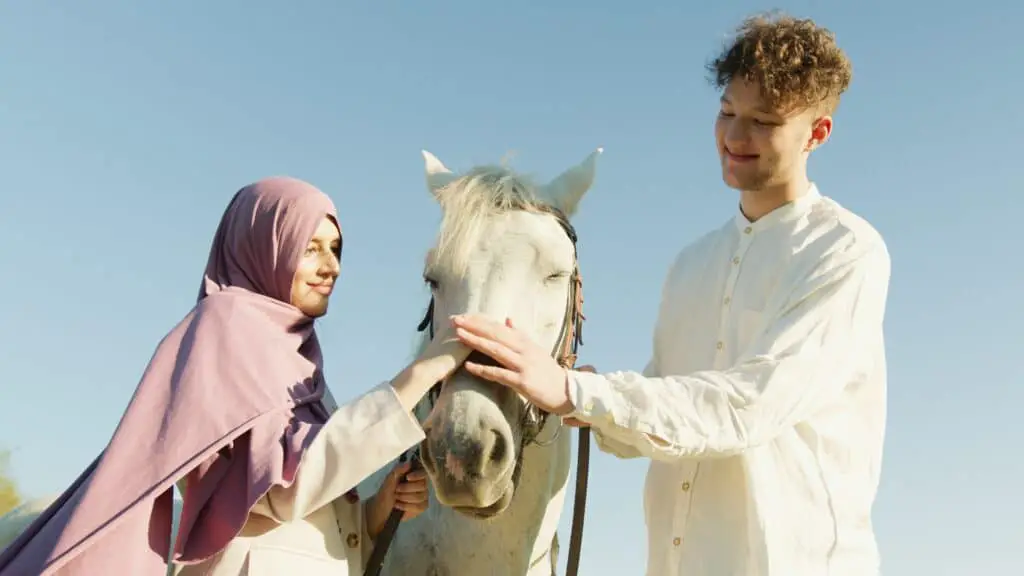
Signs a Horse Doesn’t Like You
Let’s face it, not all horses will like you, unless you’re Monty Roberts #2. As a horseback rider, you don’t have to be liked by every horse, but your own horse should at least like and respect you.
You may find that one horse that simply won’t obey or respect or trust you. This is not necessarily a reflection on you or the horse. Most likely, it’s because the horse has been through too much to open up and trust you as their herd leader.
However, you can still work with that horse in a quiet and respectful manner, eventually earning the horse’s respect and building them up to become a fairly level-headed horse. A horse respects those who put in the effort and take the time to learn about them.
Bonding With Your Horse
When you are ready to bond with your horse, there are some bonding do’s and don’ts that you should be aware of.
Bonding “Do’s”
Make friends with your horse, but ensure they respect you as the herd leader. You want to shape a trusting horse, which means the horse needs to see you as the confident leader who will tell them what to do, and the horse must obey. Some bonding activities include:
- Grooming
- Ground work
- Equine games
- Spending time with your horse and other horses in your herd
- Chilling with your horse, such as when they are lying on the ground for a snooze
- Regular feeding schedules
- Treats (not bribes)
- Meeting your horse’s general needs
Bonding “Don’ts”
When bonding with your horse, you want to foster a healthy bond, not create a disrespectful relationship where your horse is higher in the pecking order than you. Signs your horse disrespects you include a horse that’s pushy, kicks at you, stomps on your feet, turns their butt at you, head-butts you, and bites you. Deal with such behavior decisively but kindly.
Horses don’t solve their problems with violence, so resorting to hitting the horse won’t earn its respect. Instead, avoid creating situations where the horse can act disrespectfully, favoring situations where they can learn the value of respecting you as their leader.
Another big “don’t” is the use of treats as a form of bribery. Getting your horse to load for transportation to a different venue should not be done because the horse is given food to eat while you sneakily lead them aboard and slam the ramp before they know what happened. Instead, get your horse to lead well and trust you. They should load because you ask it. Once on the trailer, take the time to praise them and then reward them with a treat if you like. Food doesn’t build trust.
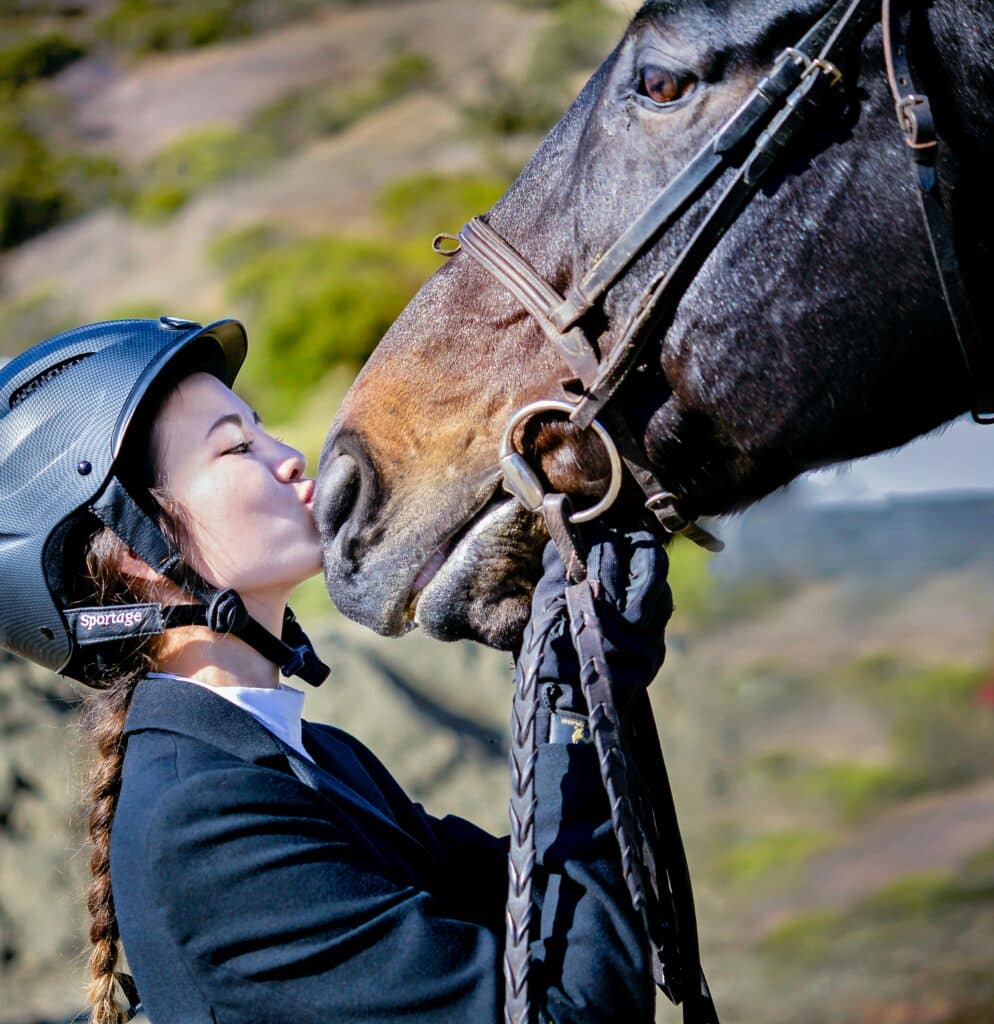
More FAQs About Building Trust With Your Horse
Do horses like to be hugged?
Humans tend to hug each other in a crunching, rib-breaking manner, which is not how horses hug. Grabbing your horse around their neck and squeezing hard won’t win their trust. Instead, try gently being present and letting them push their body against yours. Gently leaning against your horse is more comforting to them than a forceful hug. Let the horse seek you.
How can you tell if a horse is happy?
People often ask whether horses feel emotions like happiness. All animals have a concept of joy. From dogs that wag their tails when they see you to horses that neigh when your car pulls up to the yard, all animals that are bonded to you will be content when you are near.
A happy horse may push themselves near you. They may neigh when they see you approach, and if they are in the paddock, they will come running and show alert but relaxed body language. Look for pointed ears, arched necks, prancing, and excitement as they try to get near to you.
What does it mean when a horse licks you?
Aside from the obvious licking of your hand when you have feed on your hand, horses lick you when they see you as a good leader. They show their affection to other horses by engaging in allogrooming, where they lick and nibble each other in places they can’t always reach by themselves. When your horse licks you, it shows they are accepting you as part of their herd, and they may want to memorize your scent, like a mare does with her foal.
What does it mean when a horse nudges you with their nose?
Horses nudge each other as a form of play. Remember, they don’t have hands to hold each other with, so using their noses to push and play with each other is a way of communicating and bonding. A horse who gently nudges you is playing. A horse that pushes you with their nose is being disrespectful, so don’t encourage forceful pushing.
What does it mean if a horse stares at you?
Horses may stare at you when they want your attention. If you are distracted or out of reach, your horse may stare at you to get you to focus on them. If there’s a barrier such as a fence between you and your horse, they may stare at you since they can’t reach you to nudge you.
In some cases, such as with a fearful horse, they may stare at you to try and assess whether you will hurt them or if you are a predator that will eat them. A horse that’s being defensive may turn their face to you, raise their head, and stare at you to try and intimidate you.
To decide what a horse intends by staring at you, keep the rest of their body language in mind.
Earning Your Horse’s Trust, Finally!
There are signs that a horse trusts you. Look at their body language, how they move, whether they tense up when you approach, turn away, or even run away. When you have proven yourself to be a kind and wise leader who can take care of your horse’s needs, you will earn the right to be leader of the herd and win your horse’s trust.
Look beyond general signs your horse may display to find the real message your horse is whispering at you, and when you hear, your horse will open their heart to you. And if you want to learn more about a green horse and how to win them over, read all about it in this article.
Like this post? Save it on Pinterest. Follow me on Pinterest.
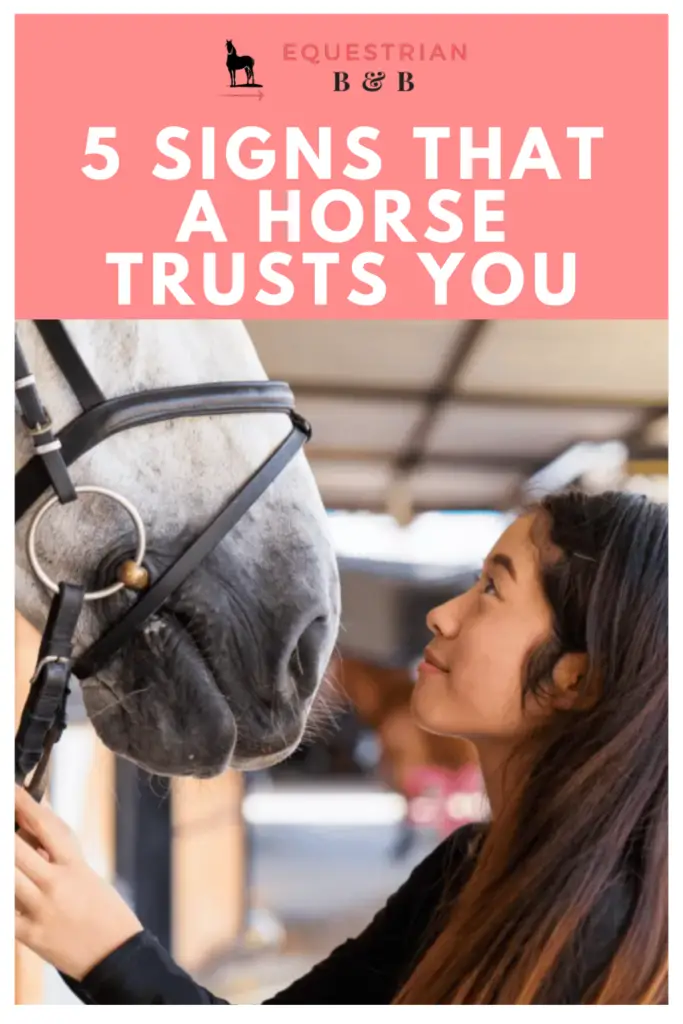

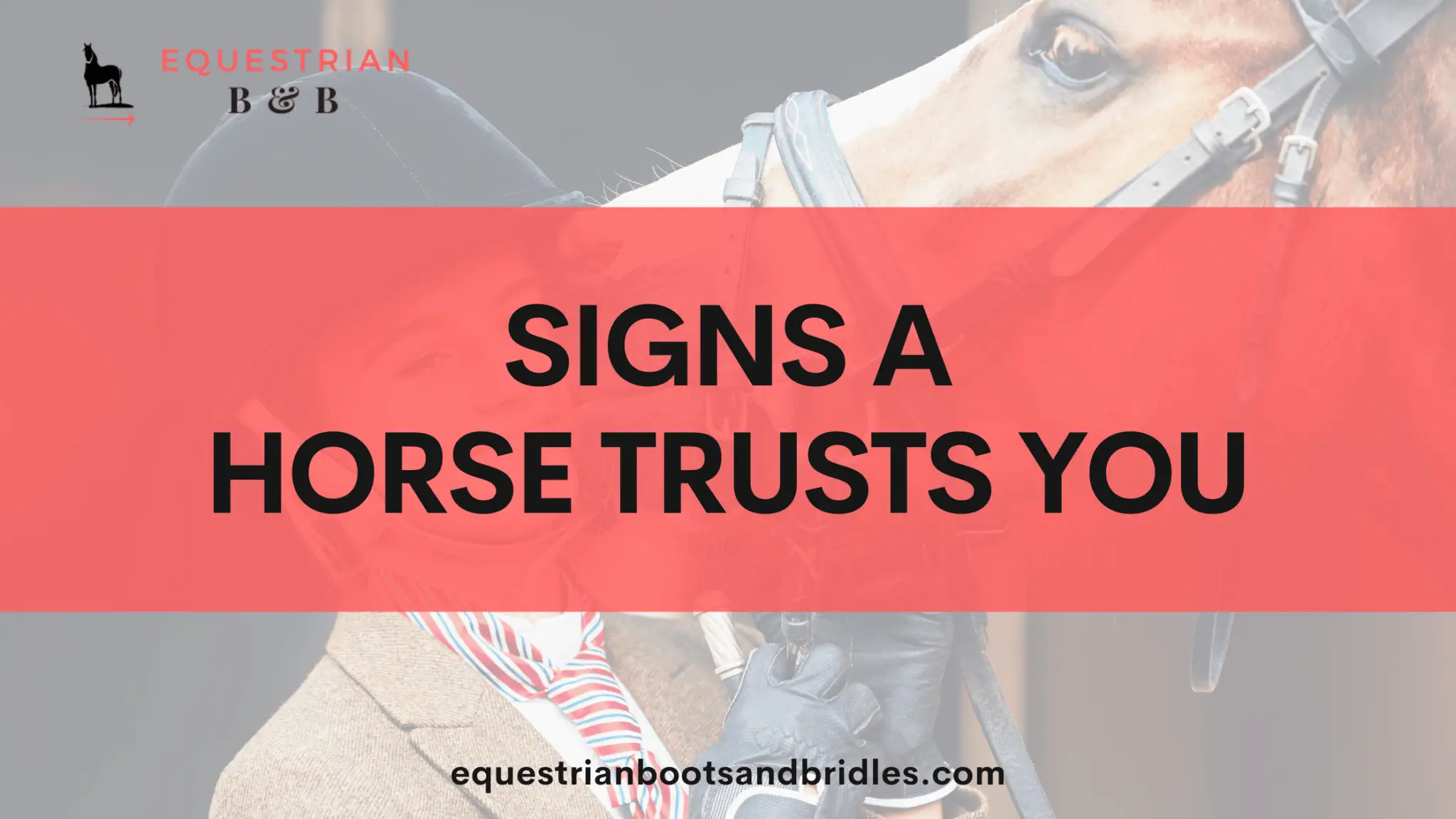
Well-written. I have observed all these signs and it’s true that horses develop bonds of trust with humans. But after falling off during horse riding, I am feeling like this trust has been weakened. My horse doesn’t trust me the same way he did before the fall. Can you suggest a way to strengthen the bond of trust between the horse and the owner?